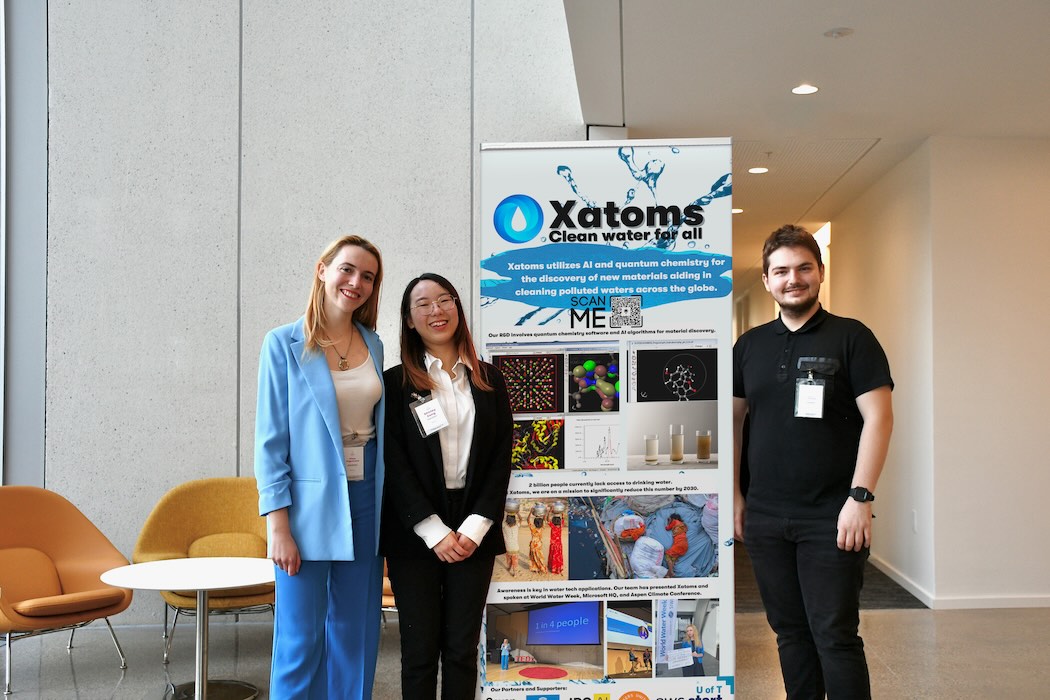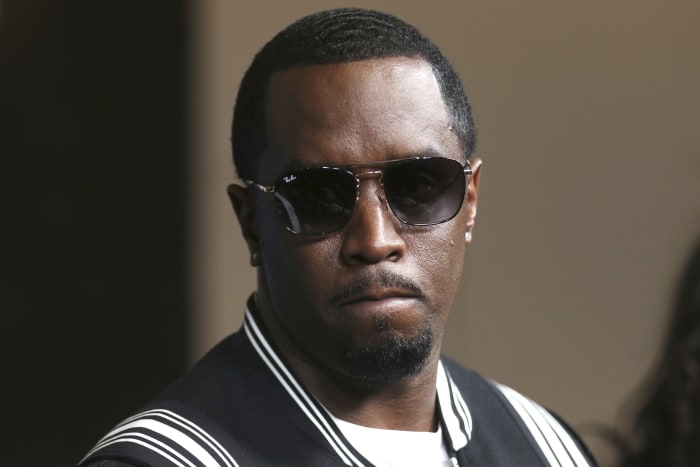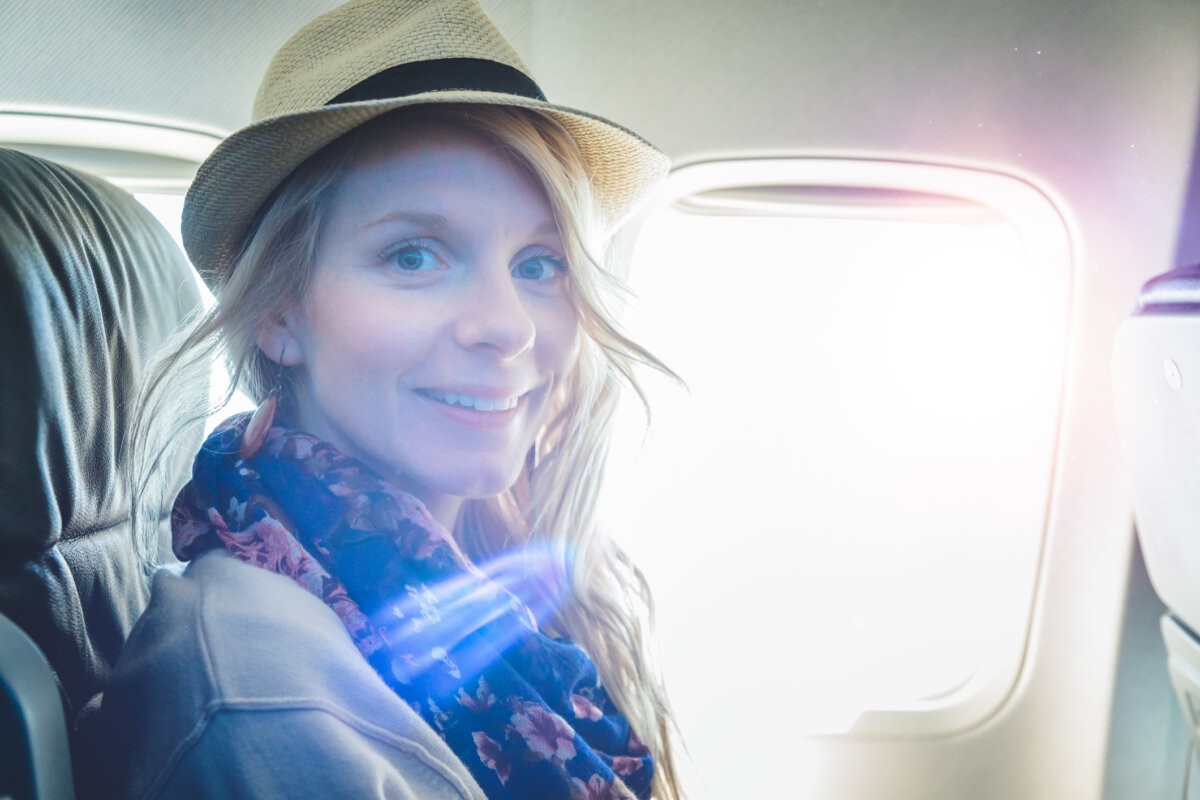World
Xatoms is planning a quantum leap to clean the world’s water

R&D-stage startup is using AI and quantum chemistry to purify the world’s most precious resource.
It was on a backpacking trip to India at the age of 14 that Diana Virgovicova got her first glance at the human cost of water pollution.
Rivers play a vital role in the natural ecosystem and the livelihoods of millions in India, but in the suburbs of Mumbai, Virgovicova observed that these critical waterways ran black, flowing with a hazardous mix of waste chemicals, dyes, and other pollutants. To her, it was immediately obvious that this was more than an environmental reality.
People were using the polluted water for showers, with young girls using the water to wash during their menstrual cycles, which could make them sick.
“I basically decided at that time that I wanted to dedicate my life to solving this problem.”
This experience would eventually lead Virgovicova to start her own company, Xatoms. The Toronto-based startup uses artificial intelligence (AI) and quantum chemistry to discover new molecules the company hopes will be able to help clean water around the world.
Virgovicova, CEO and co-founder of Xatoms, recently spoke to BetaKit about how her company is looking to use emerging technologies to clean the world’s most important natural resource.
Just add sunlight
Virgovicova’s passion for the environment took on new urgency after her trip to India. “I basically decided at that time that I wanted to dedicate my life to solving this problem,” she added.
After she returned to her home country of Slovakia, Virgovicova contacted a local university and began researching technologies for cleaning pollutants from stagnant water, such as reservoirs, ponds, lakes, individual containers, and slow-flowing rivers. It was during this time she learned about quantum chemistry software, which she says took her three years to gain proficiency in.
Quantum chemistry is a branch of chemistry that uses quantum mechanics to understand and predict the properties of atoms and molecules. It explains chemical behaviour at the molecular level, including bonding, reaction mechanisms, and the electronic structure of materials, by applying principles of quantum physics.
“I wanted to use quantum chemistry to discover a new type of material, which would be able to purify polluted water in a much more affordable and efficient way, so we can reach some of the most vulnerable communities around the world,” she added.
She created hundreds of photocatalyst models—which describe how certain materials can use light to speed up chemical reactions—and at age 17, discovered a molecule that could break down pollutants of an organic nature, such as bacteria, herbicides, and pesticides (the startup is not currently targeting heavy metals), from water when exposed to visible sunlight, without the need for ultraviolet radiation and costly equipment.
Virgovicova said Xatoms is still in the research and development stage, but aims to eventually sell a purification filter for consumers and a water treatment powder for commercial use as early as 2025.
While studying in the United Kingdom, Virgovicova received a Diploma of Excellence at the International Stockholm Junior Water Prize for her initial photocatalyst discovery.
Her next step was to build a startup, which was prompted by her move to Canada. In 2020, Virgovicova was awarded the Lester B. Pearson International Scholarship, which brought her to study computer engineering at the University of Toronto.
“I decided that I wanted to start Xatoms, which would use a combination of quantum chemistry and also our AI, which would be introduced so we could discover new materials much faster, and discover even more efficient ones than I modelled when I was 17,” she added.
That same year, she added another achievement to her résumé: a Cansbridge Fellowship, which sponsors a small number of students studying at Canadian universities with a $10,000 scholarship to pursue a summer internship in Asia.
While completing the fellowship in Asia, Virgovicova met fellow Cansbridge recipients and eventual co-founders: Shirley Zhong, now Xatoms’ COO; and Kerem Topalismailoglu, now CTO. All three co-founders are international students with a background in software development.
Accelerating with AI
Virgovicova explained that quantum chemistry is well suited for modelling new molecules because it provides a conceptual framework to understand the behaviour of atoms and molecules at the quantum level.
“[Quantum chemistry] can help show how these matters would react in different types of environments, so you don’t have to spend a lot of money on the work in the lab,” she added.
Xatoms uses AI algorithms to speed up the molecule discovery process by sifting through vast arrays of chemicals and pinpointing potential molecular structures for photocatalysts and other materials. The startup’s algorithms focus on achieving three desirable characteristics for molecule candidates: stability, low cost, and low environmental impact.
From there, Xatoms uses AI-powered quantum chemistry calculations to predict candidate molecules’ behaviour under different conditions and identify the most suitable molecules for treating water.
The startup is currently working with Alexandra Tavasoli, a professor at the University of British Columbia to develop its water purification filter, which will be coated with its end material. The startup has also secured a partnership with Wavemakers United Foundation, which Virgovicova said will help the startup reach nonprofits in countries like Nigeria, where it is looking to eventually deploy its products.
Once developed, Xatoms plans to sell its powder material directly to water organizations, while its filter will be sold directly to individuals and through NGOs. The startup also plans to license its software for material discovery to small and mid-sized water plants to help them combat specific pollutants.
To ensure the material is safe for human consumption, Virgovicova said Xatoms uses heterogeneous photocatalysts, which allow the catalyst to remain distinct from the water.
“The design of these catalysts ensures they remain immobilized on solid supports or are easily separable after treatment, minimizing their release into the water,” she added.
Virgovicova highlighted several advantages she anticipates Xatoms’ products will offer compared to existing water filtration and purification methods. For one, physical filtration only removes larger particles, while Xatoms’ product will also remove viruses.
She also anticipates that the material will be more cost-effective than chlorine tablets and will operate without the need for fuel or electricity, which is required for boiling. “This is a significant advantage, considering the electricity in rural communities is often unstable,” she added.
Since launching Xatoms, Virgovicova and her team have achieved several milestones, including Virgovicova becaming one of 36 candidates across Canada to join the NEXT36 cohort. She is also a Canadian delegate for the G20 Young Entrepreneurs’ Alliance, a delegation that issued a joint statement last year to the United Nations General Assembly focused on the urgent need for water action. Virgovicova also hosted a TEDx talk focused on water pollution, quantum computing, and AI last year.
To date, Xatoms has raised $180,000 CAD, all through non-dilutive funding. Most of this came from a $100,000 USD grant from the 776 Fellowship, a two-year program for youth entrepreneurs led in part by Reddit co-founder Alexis Ohanian. Virgovicova said the startup aims to raise its first round of venture funding this year.
One of Xatoms’ photocatalysts has already been synthesized, and the startup is applying for a trade secret in order to synthesize more. Xatoms was also recently accepted into the Quantum Stream of Creative Destruction Lab, and has plans to work with SpinUp, a wet lab incubator based at the University of Toronto.
A global problem with personal stakes
Water pollution is a global issue with significant implications for health, ecosystems, and economies. One 2023 study predicted that by 2100, up to 5.5 billion people could be exposed to polluted water.
Climate change intensifies these challenges by heightening the frequency of droughts and floods, which increases the occurrence of waterborne diseases.
Virgovicova also emphasized the impact of this problem on women and girls. Women often bear the primary responsibility for water collection and caregiving in many societies, she noted, which may limit their education and access to future opportunities. Women also face exposure to pollutants that can have specific impacts on their reproductive health.
“I think what really motivated me to start my journey is the combination of how water pollution is connected to education of women, and how, if we solve this problem and raise awareness about it, we can send more girls to schools and reduce gender inequalities,” she added. “If we cannot educate women, then the gender gap is going to get wider.”











